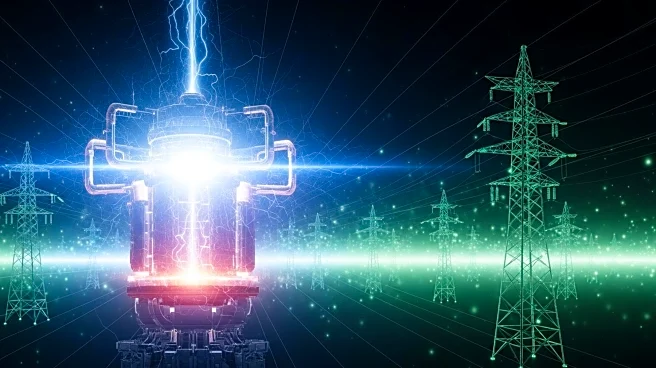What's Happening?
The U.S. is facing increasing pressure on its power infrastructure due to rising electricity demand driven by artificial intelligence, electrification, industrial reshoring, and population growth. The demand is projected to grow by 25% by 2030 and 78% by 2050, according to the ICF. As fossil fuel plants are being shut down due to aging infrastructure and high operational costs, the U.S. is looking towards fusion energy as a solution. Fusion energy is seen as a clean, sustainable, and cost-effective technology that can provide continuous power. Representative Brian Babin highlighted the importance of commercializing fusion energy to set global standards and influence supply chains. Companies like Commonwealth Fusion Systems and Helion are leading the charge in developing fusion technology, with tech giants such as Microsoft and Google showing interest.
Why It's Important?
Fusion energy presents a significant opportunity for the U.S. to secure its energy independence and maintain its competitive edge in technology. The global market for fusion energy is expected to reach over $840 billion by 2040, attracting major investments from tech leaders. Successfully commercializing fusion energy could reverse the trend of losing supply chain control to China, which currently dominates solar panel, wind turbine, and lithium-ion battery production. Fusion energy could create millions of jobs and fuel growth in various sectors, including AI and IT. However, the U.S. must address challenges in technology development, supply chain resilience, and distribution infrastructure to lead in fusion energy.
What's Next?
To meet the projected global power demand, the world will need around 1,500 fusion plants by 2025. The U.S. must incentivize private investment and public-private partnerships in fusion technology, build domestic supply chains for critical components, and modernize the grid. Government-funded fusion projects should prioritize American-made technology to strengthen the domestic fusion industry. Failure to prioritize fusion development could result in losing supply chain control to competitors like China.
Beyond the Headlines
Fusion energy not only promises to address electricity demand but also offers a strategic opportunity to enhance U.S. national security and economic leadership. Developing advanced materials and technologies for fusion energy could lead to innovations in other sectors, such as AI and life sciences. The U.S. must make strategic choices now to lead the world into an era of clean, abundant energy.










